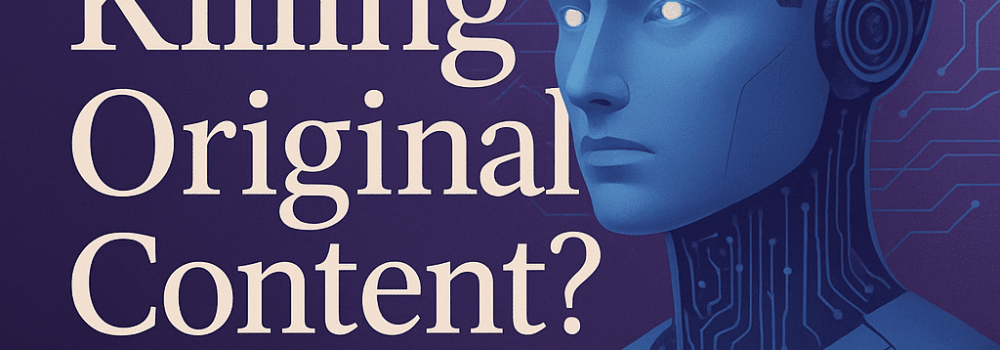Artificial Intelligence has changed the way we create, consume, and rank content online. From AI writing assistants to algorithm-driven search engines, the digital space is more crowded than ever. But with all this automation, many are asking: Is AI killing original content?
The reality is that while AI speeds up production, it has also created a flood of similar-looking articles and blog posts. Readers – and Google – are starting to notice. So, if you want to stand out, originality isn’t just nice to have; it’s essential for survival in modern SEO.
The Problem with AI-Generated Content
- Over-saturation: AI makes it easy to churn out bulk content, but much of it sounds repetitive and template-driven.
- Lack of depth: Algorithms can process information but often miss out on genuine insight, lived experience, or fresh perspectives.
- SEO cannibalization: When dozens of AI-written blogs target the same keyword with nearly identical phrasing, your content risks being buried.
Google itself has emphasized helpful content in its algorithm updates, prioritizing expertise and originality over keyword stuffing and regurgitated copy.
Why Originality Still Wins
Authentic content stands out because it does what AI usually can’t:
- Brings in personal experience or case studies.
- Offers thought leadership with unique opinions.
- Provides data, examples, or storytelling unavailable elsewhere.
Readers trust content that feels human. Algorithms also use engagement signals like time on page, click-through rates, and backlinks, which favor pieces that resonate beyond keyword checks.
How to Stand Out in the Age of AI
- Infuse expertise: Add first-hand experiences, client case studies, or industry insights AI cannot replicate.
- Build topical authority: Instead of chasing every trending keyword, focus on creating clusters of deep, authoritative content around your niche.
- Leverage multimedia: Images, videos, podcasts, and interactive content make your brand stand apart while increasing engagement.
- Optimize smartly: Continue using SEO basics like optimized titles, schema markup, and internal linking, but balance them with natural, reader-friendly writing.
- Inject personality: Tone, voice, and storytelling build a brand identity that an algorithm simply can’t duplicate.
The Bottom Line
AI isn’t killing content – unoriginality is. If you rely solely on automated tools without adding human insight, your content risks blending into the noise. But for businesses and creators who invest in originality, creativity, and expertise, this is actually an opportunity.
By striking a balance between AI efficiencies and authentic human input, you can create content that both ranks well and truly connects with your audience.
Here’s an FAQ section added to your blog post, along with proper FAQ schema markup that you can implement directly into your site (via RankMath, Yoast, or custom schema injection).
FAQ Section
Q1: Is AI content bad for SEO?
No, AI content isn’t inherently bad for SEO. However, low-quality, generic AI-generated text without originality or expertise will struggle to rank. Search engines now prioritize helpful, human-driven content.
Q2: How can I make AI-assisted content original?
You can make AI-assisted content original by adding personal insights, industry case studies, unique data, and brand storytelling. AI can help with structure, but your expertise ensures authenticity.
Q3: Does Google penalize AI content?
Google does not penalize content just for being AI-generated. Instead, it evaluates whether the content is useful, relevant, and written with expertise. Poorly written AI-first content can harm rankings.
Q4: What makes content stand out today?
Content stands out when it demonstrates authority, provides unique perspectives, integrates multimedia elements, and speaks directly to the audience’s real needs.
Q5: Should I still use AI tools for SEO writing?
Yes, AI tools can speed up research, outline creation, and optimization. The key is not to rely solely on AI but to combine it with your experience, insights, and creativity to keep the content original.

